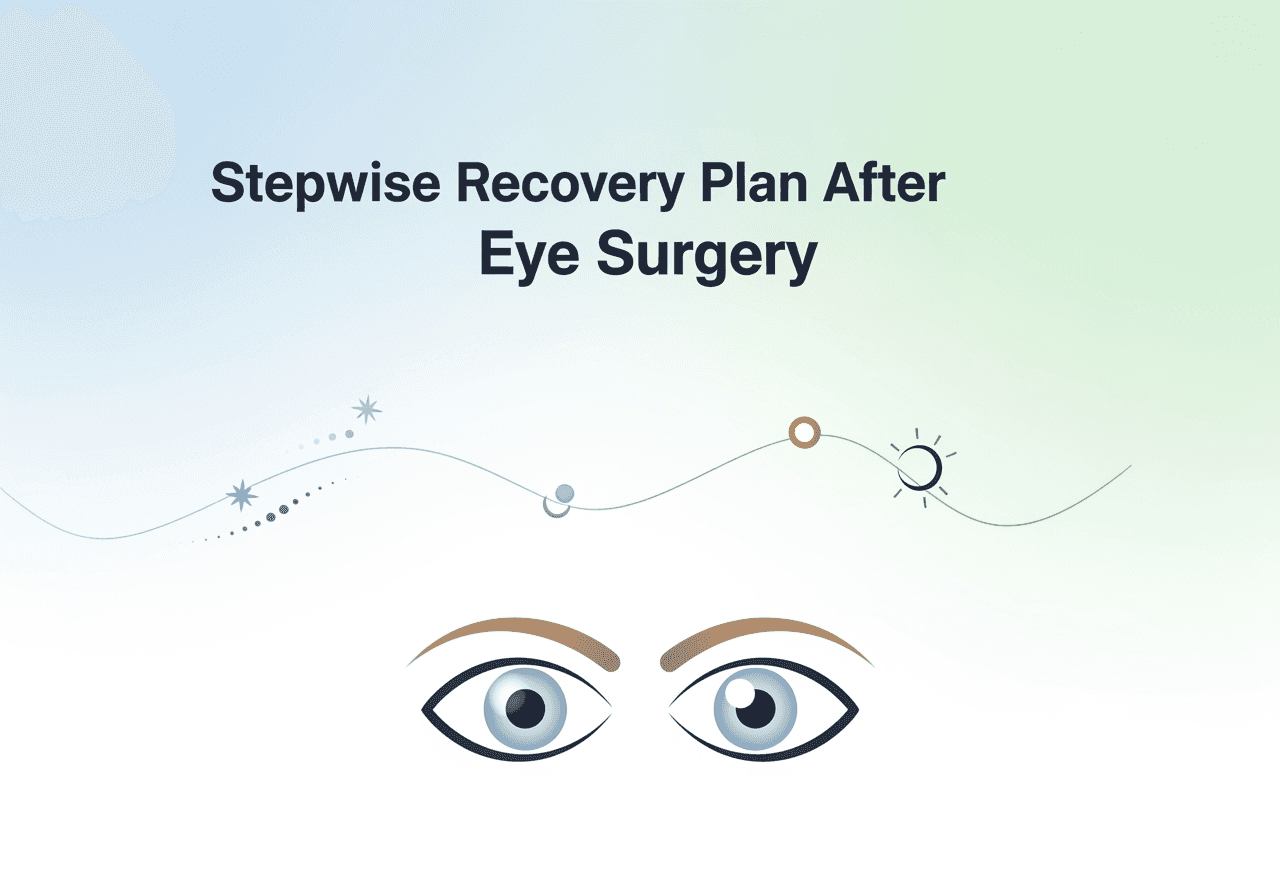
Stepwise Recovery Plan After Eye Surgery
31 Oct, 2025
 Healthtrip
HealthtripUnderstanding the Initial Post-Op Phase
The first few days following eye surgery are crucial for setting the stage for a successful recovery. Immediately after your procedure, prioritize rest to allow your eye to begin healing. You might experience some discomfort, such as mild pain, itching, or a gritty sensation. Your doctor at facilities like Memorial Sisli Hospital will likely prescribe pain medication or artificial tears to alleviate these symptoms. It's vital to follow their instructions precisely, and avoid rubbing or putting pressure on your eye. Protecting your eye from bright light is also essential, so wear sunglasses even indoors if necessary. Limit screen time and activities that require focused vision, such as reading or watching television, as these can strain your eye. Remember, these initial days are about prioritizing rest and adhering closely to your doctor's recommendations to minimize complications and promote optimal healing.
Most popular procedures in India
Managing Discomfort and Pain
Let's be real, discomfort after eye surgery is pretty common, but it's totally manageable. The key is staying ahead of the pain with prescribed medication. Don't wait until you're in agony to pop a pill! If you're experiencing itching, those artificial tears can be your best friend, especially the preservative-free kind, which are gentler on your healing eye. A cool compress applied gently can also work wonders for soothing irritation and reducing swelling, just remember not to apply it directly to your eye. If the pain persists or worsens despite medication, it's always a good idea to check in with your doctor – Healthtrip can help you connect with medical professionals for follow-up consultations, even virtually. And remember, we're all different, so what works for one person might not work for another. Listen to your body and don't hesitate to reach out for help if you need it, whether you had your surgery at Bangkok Hospital or another facility, we are here for you.
Protecting Your Eye and Preventing Infection
Think of your eye as a VIP in need of serious protection during the recovery phase. Shielding it from potential harm is paramount to prevent infection and ensure optimal healing. Your doctor might recommend wearing a protective shield or eye patch, especially at night, to prevent accidental rubbing or bumping while you sleep. Avoid activities that could expose your eye to dust, dirt, or other irritants, and be extra cautious when showering or washing your face. Keep your hands scrupulously clean and avoid touching your eye unless absolutely necessary, and always wash your hands thoroughly beforehand. Be diligent about using prescribed eye drops as directed; these drops often contain antibiotics to prevent infection and steroids to reduce inflammation. Should you notice any signs of infection, such as increased redness, pain, swelling, or discharge, contact your doctor immediately, Healthtrip is here to help you locate best doctors at facilities like Fortis Memorial Research Institute, Gurgaon for the best possible treatment and recovery.
Wellness Treatments
Give yourself the time to relax
Lowest Prices Guaranteed!

Lowest Prices Guaranteed!
Gradually Reintroducing Activities
As your eye heals you'll be eager to get back to your normal routine, but it's crucial to reintroduce activities gradually to avoid overstraining your eye. Start with light activities like gentle walks or listening to music, and slowly increase the duration and intensity as you feel comfortable. Avoid strenuous activities like heavy lifting, vigorous exercise, or bending over for extended periods, as these can raise pressure in your eye and impede healing. When returning to work, consider adjusting your workstation to minimize eye strain, such as optimizing lighting and screen distance. If your job involves prolonged screen time, take frequent breaks to rest your eyes and practice the 20-20-20 rule: every 20 minutes, look at something 20 feet away for 20 seconds. And remember, patience is key – your eye needs time to heal fully, and pushing yourself too hard can set back your recovery. Healthtrip can help you find resources and support to navigate this phase, whether you had your surgery at NMC Specialty Hospital, Al Nahda, Dubai, or another location.
Long-Term Eye Care and Follow-Up
Your commitment to eye care doesn't end once the initial recovery period is over. Long-term eye care is essential for maintaining optimal vision and detecting any potential complications early on. Follow your doctor's recommendations for regular follow-up appointments, even if you feel your vision is perfectly clear. These check-ups allow your doctor to monitor your eye's health, assess the stability of your vision, and address any concerns you may have. Protecting your eyes from sun damage by wearing sunglasses with UV protection is a must, as is maintaining a healthy lifestyle with a balanced diet rich in antioxidants. If you experience any changes in your vision, such as blurry vision, double vision, or halos around lights, don't hesitate to contact your doctor promptly. Healthtrip can connect you with trusted eye care professionals for ongoing support and guidance, ensuring your vision remains sharp and healthy for years to come, and whether that may be at Saudi German Hospital Cairo, Egypt or another location, we will get you the best possible doctor to help.
Understanding Common Eye Surgeries
Eye surgery can seem daunting, a plunge into the unknown where the stakes are incredibly high – our vision. But knowledge is power, and understanding the different types of eye surgeries available can alleviate some of that anxiety. At Healthtrip, we believe in empowering you with information so you can make informed decisions about your healthcare journey. Whether you're considering LASIK to ditch those pesky glasses, cataract surgery to restore your clear vision, or another procedure to address a specific eye condition, understanding the basics is crucial. We are connected with world class hospitals like Vejthani Hospital and Yanhee International Hospital in Bangkok, Thailand, which are equipped with cutting-edge technology and experienced ophthalmologists. Remember, you're not alone in this journey. Millions of people undergo eye surgery every year, and with the right preparation and care, the outcomes can be life-changing. Let's delve into some common eye surgeries to shed light on what they entail and how they can improve your vision and overall quality of life. From initial consultation to post-operative care, we'll walk you through the process, providing clarity and support every step of the way.
LASIK (Laser-Assisted In Situ Keratomileusis)
Imagine waking up every morning and seeing the world in crisp, clear detail without reaching for your glasses or fumbling for contact lenses. That's the promise of LASIK, a popular refractive surgery designed to correct nearsightedness, farsightedness, and astigmatism. During LASIK, a surgeon uses a precise laser to reshape the cornea, the clear front surface of your eye, allowing light to focus correctly on the retina. The procedure is typically quick, lasting only minutes per eye, and many patients experience significant vision improvement within days. At Healthtrip, we connect you with skilled surgeons at facilities like Fortis Memorial Research Institute, Gurgaon, India, who use advanced LASIK technology to ensure optimal outcomes. If you are in Europe, you can also consider Breyer, Kaymak & Klabe Augenchirurgie in Germany. Before undergoing LASIK, a thorough eye exam is essential to determine your candidacy and discuss your expectations. Factors like corneal thickness, overall eye health, and refractive stability are carefully evaluated. While LASIK boasts a high success rate, it's crucial to have realistic expectations and understand the potential risks and benefits. Healthtrip is here to guide you through the assessment process and connect you with trusted specialists who can answer all your questions and address any concerns you may have.
Cataract Surgery
Cataracts, the clouding of the natural lens of your eye, are a common age-related condition that can gradually blur your vision and make it difficult to see clearly. Cataract surgery is a highly effective procedure to restore clear vision by removing the clouded lens and replacing it with an artificial lens implant, called an intraocular lens (IOL). The surgery is typically performed on an outpatient basis and involves minimal discomfort. Technological advancements have revolutionized cataract surgery, offering options like laser-assisted cataract surgery and premium IOLs that can correct astigmatism and even reduce your dependence on glasses. Healthtrip partners with hospitals like Saudi German Hospital Cairo, Egypt, that excel in modern cataract surgery techniques. If you are in Turkey you can also consider Memorial Sisli Hospital and LIV Hospital, Istanbul. Deciding on the right type of IOL is a crucial part of the cataract surgery process. Your surgeon will discuss your lifestyle and vision goals to help you choose an IOL that best suits your needs. Whether you're looking for improved distance vision, near vision, or a combination of both, there's an IOL option that can help you achieve your desired outcome. Healthtrip is dedicated to facilitating access to top-tier cataract surgery services, ensuring a seamless and comfortable experience from initial consultation to post-operative care.
Other Eye Surgeries
Beyond LASIK and cataract surgery, there's a spectrum of other eye surgeries designed to address various conditions and improve vision. These include glaucoma surgery to lower intraocular pressure and prevent vision loss, retinal detachment surgery to reattach the retina to the back of the eye, corneal transplant to replace a damaged cornea with a healthy one, and strabismus surgery to correct misaligned eyes. The specific type of surgery required depends on your individual eye condition and overall health. At Healthtrip, we recognize the importance of personalized care and offer access to a network of specialized ophthalmologists who are experts in their respective fields. If you are in Dubai, you can also consider NMC Specialty Hospital, Al Nahda, Dubai. Whether you're dealing with a rare eye disorder or a common vision problem, we can help you find the right specialist and the right treatment plan to preserve and enhance your vision. We work with hospitals that have state-of-the-art diagnostic equipment and surgical facilities, ensuring that you receive the highest quality care in a comfortable and supportive environment. Healthtrip is committed to being your trusted partner in your journey to better eye health.
Immediate Post-Operative Care: The First 24 Hours
The first 24 hours after eye surgery are crucial for a successful recovery. It's a time to rest, protect your eye, and follow your surgeon's instructions meticulously. Think of it as a delicate dance between your body's natural healing process and your diligent care. While you might feel a mix of excitement and apprehension, rest assured that with proper care, you'll be well on your way to improved vision. Healthtrip understands the importance of clear and concise post-operative instructions and strives to ensure that you have all the information you need to navigate this critical period with confidence. The care provided at facilities like Vejthani Hospital and Yanhee International Hospital, Bangkok, Thailand, extends beyond the operating room, with detailed guidance on what to expect and how to manage your recovery at home. Remember, patience is key during this initial phase. Avoid rushing back to your normal routine and prioritize rest to allow your eye to heal properly. Healthtrip is here to provide ongoing support and answer any questions that may arise during your recovery journey, ensuring peace of mind and optimal outcomes.
Rest and Relaxation
Your body needs rest to heal, and that's especially true after eye surgery. The first 24 hours should be dedicated to relaxing and avoiding strenuous activities. This means no heavy lifting, vigorous exercise, or anything that could put pressure on your eye. Imagine your eye as a delicate flower that needs gentle care to bloom. Avoid straining your eyes by limiting screen time, reading, and other visually demanding tasks. Instead, listen to audiobooks, podcasts, or soothing music to keep yourself entertained without stressing your vision. If you feel the urge to nap, go for it! Sleep is one of the best ways to promote healing. Healthtrip encourages you to create a comfortable and relaxing environment where you can unwind and focus on your recovery. Remember, taking it easy during this initial period can significantly contribute to a smooth and successful healing process. Reputable institutions such as Saudi German Hospital Cairo, Egypt, emphasize these crucial post-operative care instructions for their patients, ensuring they are well-informed and prepared.
Eye Protection
Protecting your eye from injury and infection is paramount during the first 24 hours. Your surgeon will likely provide you with an eye shield or protective glasses to wear, especially while sleeping. This shield acts as a barrier, preventing you from accidentally rubbing or bumping your eye. It also helps to keep dust, debris, and other irritants away from the surgical site. Be diligent about wearing the protective eyewear as instructed by your doctor. Avoid touching your eye with your hands, as this can introduce bacteria and increase the risk of infection. Wash your hands thoroughly before applying any eye drops or ointment. Avoid swimming, hot tubs, and other activities that could expose your eye to contaminated water. Healthtrip emphasizes the importance of adhering to these protective measures to minimize the risk of complications and promote optimal healing. Facilities like Fortis Memorial Research Institute, Gurgaon, India, provide patients with comprehensive post-operative care kits that include all the necessary supplies and instructions to protect their eyes during the recovery period.
Managing Discomfort
It's normal to experience some discomfort after eye surgery, such as mild pain, itching, or a gritty sensation. Your surgeon may prescribe pain medication or recommend over-the-counter pain relievers to manage any discomfort. Follow your doctor's instructions carefully and take the medication as prescribed. Avoid rubbing your eye, as this can worsen the discomfort and potentially damage the surgical site. Applying a cold compress to your eye can help reduce swelling and alleviate pain. Be sure to wrap the compress in a clean cloth to avoid direct contact with your skin. If you experience severe pain, sudden vision changes, or any other concerning symptoms, contact your surgeon immediately. Healthtrip is committed to ensuring that you have access to prompt and responsive medical care should any issues arise during your recovery. Renowned hospitals like Memorial Sisli Hospital and LIV Hospital work to ensure patient convenience and minimize discomfort during post-operative care.
Medication and Eye Drops: A Detailed Guide
Following your eye surgery, medication and eye drops play a vital role in preventing infection, reducing inflammation, and promoting healing. It's crucial to understand the purpose of each medication and follow your doctor's instructions precisely. Think of these medications as your allies in the healing process, working diligently to protect your eye and ensure a successful outcome. However, it can be easy to make mistakes or get confused on the medication, so let's work through it. At Healthtrip, we recognize the importance of clear and comprehensive medication instructions and strive to provide you with a detailed guide to help you navigate this aspect of your recovery. Facilities like Vejthani Hospital and Yanhee International Hospital in Bangkok, Thailand, offer thorough medication counseling to ensure that patients understand how to use their eye drops and medications correctly. Remember, consistency and adherence to your doctor's instructions are key to achieving optimal results. Healthtrip is here to support you throughout your medication regimen, answering any questions you may have and ensuring that you feel confident in your ability to administer your eye drops and medications effectively.
Types of Eye Drops
After eye surgery, you'll likely be prescribed a combination of eye drops to address different aspects of the healing process. Antibiotic eye drops help prevent infection by killing bacteria that could potentially invade the surgical site. Steroid eye drops reduce inflammation and swelling, promoting faster healing and minimizing discomfort. Artificial tears provide lubrication and help alleviate dryness, which is a common side effect of eye surgery. The specific type and frequency of eye drops will vary depending on the type of surgery you had and your individual needs. It's essential to understand the purpose of each eye drop and follow your doctor's instructions carefully. Healthtrip encourages you to ask your doctor any questions you may have about your eye drops to ensure that you're using them correctly and effectively. Hospitals like Saudi German Hospital Cairo, Egypt, and others provide clear and precise medication schedules to their patients, helping them stay on track with their eye drop regimen.
Proper Administration Techniques
Administering eye drops correctly is crucial to ensure that they reach the intended target and provide maximum benefit. Start by washing your hands thoroughly with soap and water. Tilt your head back and gently pull down your lower eyelid to create a small pocket. Hold the eye drop bottle above your eye, being careful not to touch the tip of the bottle to your eye or any other surface. Squeeze one drop into the pocket you created and gently close your eye for a few seconds. Avoid blinking or squeezing your eye shut, as this can push the eye drop out. If you need to administer multiple eye drops, wait several minutes between each drop to allow each medication to be absorbed properly. If you have difficulty administering eye drops yourself, ask a family member or friend for assistance. Healthtrip recommends practicing your eye drop technique before surgery to become comfortable with the process. Facilities like Fortis Memorial Research Institute, Gurgaon, India, provide patients with demonstrations on proper eye drop administration techniques to ensure that they feel confident in their ability to use their medications correctly.
Potential Side Effects and Interactions
Like all medications, eye drops can sometimes cause side effects. Common side effects include temporary burning or stinging, blurred vision, and a gritty sensation. These side effects are usually mild and resolve on their own. However, if you experience severe or persistent side effects, contact your doctor immediately. It's also important to inform your doctor about any other medications you're taking, including over-the-counter drugs and herbal supplements, as some medications can interact with eye drops. For example, certain antihistamines can worsen dry eye symptoms, while blood thinners can increase the risk of bleeding after surgery. Healthtrip emphasizes the importance of open communication with your doctor about all your medications and medical conditions. Hospitals like Memorial Sisli Hospital and LIV Hospital prioritize comprehensive medication reviews to identify potential interactions and ensure patient safety.
Also Read:
Recognizing and Addressing Potential Complications
Eye surgery, while generally safe and effective, does come with the possibility of complications. It's crucial to be aware of these potential issues and know how to respond if they arise. While Healthtrip works with world-class hospitals like Memorial Sisli Hospital and Vejthani Hospital to minimize risks, understanding potential complications can empower you to seek timely assistance and ensure the best possible outcome. Think of it as knowing the emergency exits on a plane – hopefully, you won't need them, but it's good to know they're there.
One of the most common complications is infection. Signs of an eye infection can include increased redness, pain, swelling, discharge, and blurred vision. If you notice any of these symptoms, contact your doctor or the surgical team at your chosen facility, such as Yanhee International Hospital, immediately. Infections can usually be treated effectively with antibiotics, but prompt intervention is key to preventing more serious problems. Another potential issue is increased eye pressure, or glaucoma. While rare, it can occur after certain types of eye surgery. Symptoms might include eye pain, headache, nausea, and blurred vision. Again, immediate medical attention is essential. Hospitals like Fortis Hospital, Noida, have the expertise to diagnose and manage post-operative glaucoma effectively.
Other possible complications include dry eye, which can cause discomfort and blurred vision. This is often temporary and can be managed with artificial tears. However, if it persists, your doctor may recommend other treatments. In some cases, patients may experience double vision or halos around lights. These symptoms usually resolve on their own within a few weeks, but if they don't, further evaluation may be necessary. Rarely, more serious complications such as retinal detachment or bleeding inside the eye can occur. These are medical emergencies that require immediate surgical intervention. Healthtrip partners with hospitals like Singapore General Hospital that are equipped to handle such emergencies with experienced ophthalmologists and state-of-the-art facilities. It's absolutely essential to remember that any sudden changes in vision, severe pain, or unusual symptoms should be reported to your doctor or the hospital immediately. Don't hesitate or delay seeking help – your vision is precious, and early intervention can make all the difference.
Also Read:
The Importance of Follow-Up Appointments: Where to go?
Think of follow-up appointments as the crucial pit stops during a race. They're not just a formality; they're essential for monitoring your progress, detecting any potential problems early on, and ensuring a smooth and successful recovery after your eye surgery. Healthtrip emphasizes the importance of adhering to your doctor's recommended follow-up schedule, which can vary depending on the type of surgery you had and your individual healing process. These appointments are a chance for your doctor to examine your eye, check your vision, and assess how well you're responding to treatment. They can also answer any questions you may have and provide guidance on how to best care for your eye during the recovery period. For example, if you have undergone a procedure at Helios Klinikum Erfurt, the follow-up schedule will be tailored to your specific needs.
During these appointments, your doctor will typically check your visual acuity, eye pressure, and the overall health of your eye. They may also perform other tests, such as a slit-lamp examination, to look for any signs of inflammation, infection, or other complications. If any problems are detected, your doctor can take prompt action to address them, preventing them from becoming more serious. Regularly visiting hospitals like Saudi German Hospital Alexandria, Egypt for follow-ups helps in swift treatment of any complication. It's important to be honest and open with your doctor about any symptoms you're experiencing, even if they seem minor. Don't hesitate to ask questions or express any concerns you may have. Your doctor is there to support you and help you achieve the best possible outcome. If you've travelled for surgery, Healthtrip can help coordinate follow-up care with local ophthalmologists in your area, ensuring continuity of care and peace of mind. For instance, if you had surgery at Bangkok Hospital, we can assist in finding a qualified eye doctor near your home for subsequent check-ups.
Choosing where to go for follow-up appointments is as important as choosing your initial surgical team. If you had your surgery at a reputable facility like Mount Elizabeth Hospital, they will likely have a dedicated follow-up clinic with experienced ophthalmologists. Alternatively, you can consult with your regular eye doctor or find a qualified ophthalmologist in your area. Healthtrip can provide recommendations and help you find a trusted provider. Factors to consider when choosing a follow-up provider include their experience, qualifications, and accessibility. You want to ensure that they are familiar with your type of surgery and have the expertise to monitor your progress effectively. Remember, follow-up appointments are an investment in your long-term vision health. Don't skip them or delay them – they are a vital part of your recovery journey. Prioritising these appointments will help ensure that you enjoy the full benefits of your improved vision for years to come.
Lifestyle Adjustments for Optimal Recovery
Recovering from eye surgery isn't just about medication and doctor's visits; it's also about making certain lifestyle adjustments to support the healing process and protect your vision. Think of it as giving your eyes a well-deserved vacation! Healthtrip understands that these adjustments can be challenging, but they are crucial for achieving optimal results and preventing complications. The first few weeks after surgery are particularly important, so it's essential to follow your doctor's instructions carefully. One of the most important adjustments is protecting your eyes from injury. This means avoiding activities that could put you at risk of getting hit in the eye, such as contact sports or heavy lifting. You should also wear protective eyewear when doing activities around the house, such as gardening or cleaning, to prevent dust, debris, or chemicals from getting into your eyes. If you've had surgery at a center like Quironsalud Hospital Murcia, their team will provide specific guidance on protective measures tailored to your procedure.
Another key adjustment is avoiding activities that could strain your eyes. This includes reading, watching television, and using electronic devices for extended periods. These activities can cause eye fatigue and dryness, which can hinder healing. It's also important to get plenty of rest and avoid rubbing your eyes. Rubbing can irritate the eye and increase the risk of infection. If your eyes feel dry, use artificial tears as directed by your doctor. Maintaining good hygiene is also essential. Wash your hands frequently to prevent the spread of germs. Avoid touching your eyes, and be sure to clean your eyelids gently as instructed by your doctor. Sunlight is another factor to consider. Exposure to bright sunlight can damage your eyes, especially after surgery. Wear sunglasses with UV protection whenever you're outdoors, even on cloudy days. Hospitals like NMC Specialty Hospital, Al Nahda, Dubai, often provide patients with protective eyewear and specific sunlight recommendations.
Finally, it's important to eat a healthy diet and stay hydrated. A balanced diet rich in fruits, vegetables, and omega-3 fatty acids can support overall eye health and promote healing. Staying hydrated helps to keep your eyes lubricated and prevents dryness. Remember, these lifestyle adjustments are temporary, but they can make a big difference in your recovery. By following your doctor's instructions and taking good care of your eyes, you can help ensure a successful outcome and enjoy improved vision for years to come. Healthtrip is here to support you throughout your recovery journey, providing guidance and resources to help you make these adjustments and stay on track. If you have any questions or concerns, don't hesitate to reach out to our team or your healthcare provider at a facility like LIV Hospital, Istanbul.
Also Read:
Conclusion
Embarking on eye surgery is a significant decision, one that holds the promise of clearer vision and an improved quality of life. By understanding the potential complications, prioritizing follow-up appointments, and embracing necessary lifestyle adjustments, you’re actively participating in a journey towards optimal recovery. Healthtrip is dedicated to guiding you through every step, from connecting you with world-class facilities like Fortis Memorial Research Institute, Gurgaon, to providing comprehensive support and resources throughout your healing process. Remember that your dedication to post-operative care is as critical as the surgery itself. Adhering to your medication schedule (as discussed earlier!), attending follow-up appointments, and carefully implementing lifestyle adjustments designed to protect your eyes all contribute significantly to your success. Think of it as tending to a delicate garden – consistent care ensures vibrant growth.
The expertise of the surgeons at hospitals like Memorial Bahçelievler Hospital coupled with your commitment to recovery paves the way for a positive outcome. Should any concerns arise, such as those mentioned earlier, prompt communication with your medical team is paramount. Early detection and intervention can prevent minor issues from escalating into larger problems, ensuring continued progress. Healthtrip remains your trusted partner in this endeavor. Our network of accredited hospitals and experienced ophthalmologists, including those at Vejthani Hospital, are committed to providing the highest standards of care. We also offer personalized support to navigate any challenges you may encounter, whether it's coordinating follow-up appointments or accessing resources for long-term eye health.
Ultimately, the journey to improved vision is a collaborative effort. It involves the skill and dedication of your medical team, your active participation in the recovery process, and the unwavering support of Healthtrip. As you embrace the lifestyle adjustments, prioritize follow-up care, and remain vigilant about potential complications, you're not just healing your eyes – you're investing in a brighter, clearer future. As you move forward, take comfort in knowing that Healthtrip is here to support you every step of the way, ensuring a smooth and successful transition to a world of enhanced visual clarity. Embrace the possibilities, celebrate your progress, and look forward to a future filled with sharper, more vibrant experiences. With the right approach and support, you can confidently navigate your eye surgery journey and unlock a new chapter of visual well-being.
Related Blogs
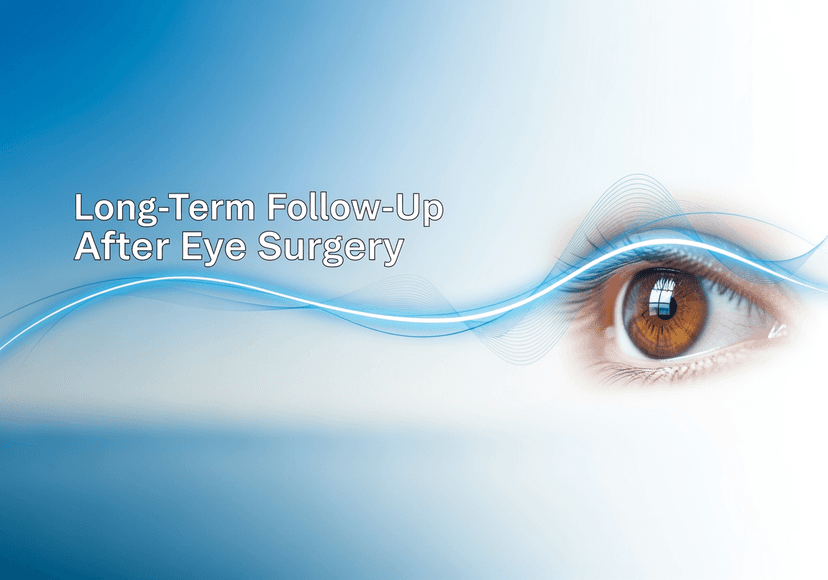
Long-Term Follow-Up After Eye Surgery
Detailed insights into eye surgery – doctors, hospitals, technology, recovery,

Healthtrip’s Transparency in Eye Surgery Pricing and Packages
Detailed insights into eye surgery – doctors, hospitals, technology, recovery,
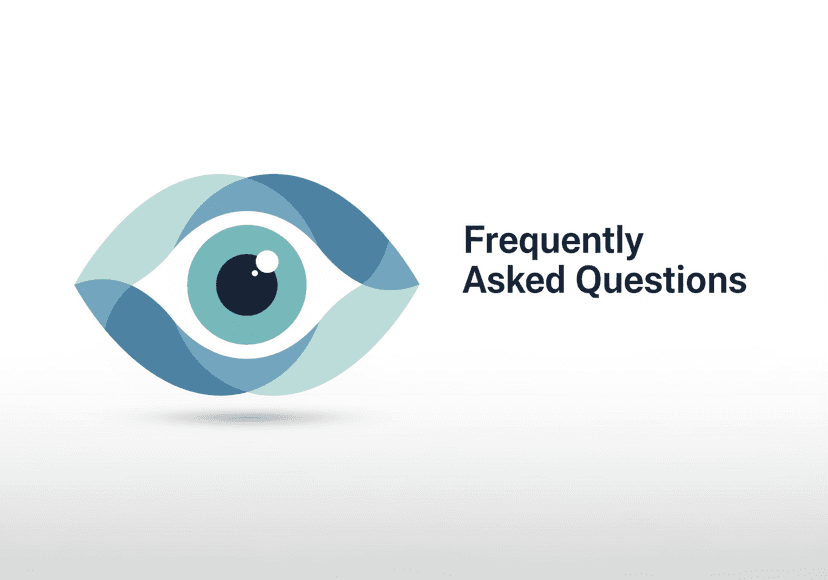
Frequently Asked Questions About Eye Surgery
Detailed insights into eye surgery – doctors, hospitals, technology, recovery,

Advanced Robotic Technology Used in Eye Surgery
Detailed insights into eye surgery – doctors, hospitals, technology, recovery,
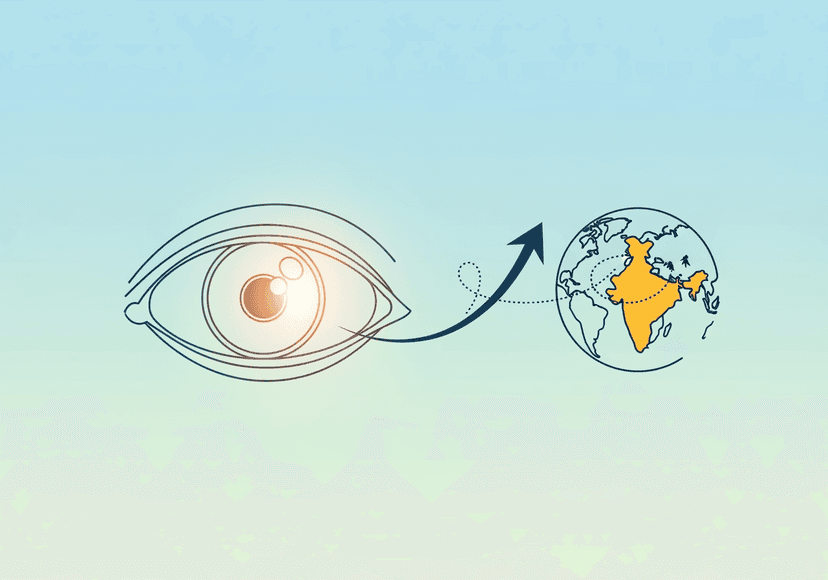
How Healthtrip Supports Foreign Patients for Eye Surgery in India
Detailed insights into eye surgery – doctors, hospitals, technology, recovery,
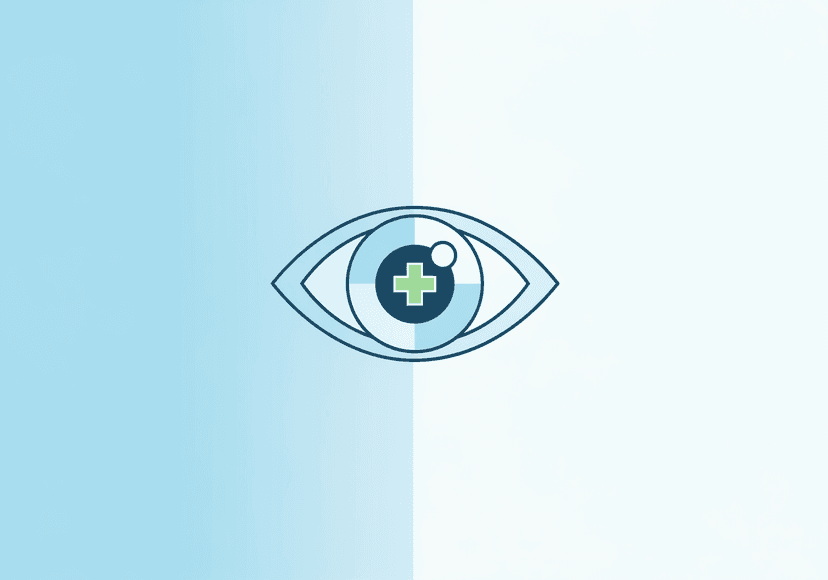
Top Medical Packages for Eye Surgery Offered by Healthtrip
Detailed insights into eye surgery – doctors, hospitals, technology, recovery,










